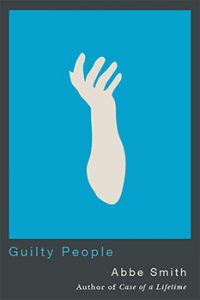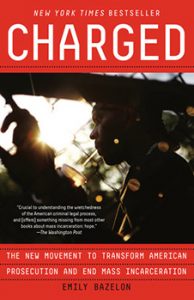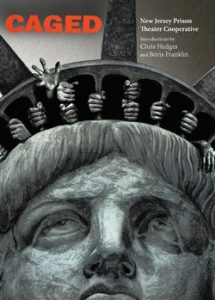A Review of Guilty People by Abbe Smith
As an organization that champions the critical role of literature in bearing witness, we are sensitive to the pandemic’s impact on authors committed to challenging and exposing the carceral state. Temperature Check, Volume 7: The Literary Issue temporarily shapeshifts in format to support those writers with recent releases that contribute to critical public dialogue about mass incarceration, forefronting ideas and concepts that will remain urgent after the pandemic subsides. View the full issue here.

The Complexity of Guilt:
A review of Abbe Smith’s Guilty People
By Ash Holland
Abbe Smith’s central premise in Guilty People is fairly straightforward: Who among us isn’t guilty? “The guilty are not a separate species,” Smith informs the reader. Rather, they are around us, they are among us, they are us—though many of us have more privilege or fortune, or a combination of both, than those who get caught. Guilt, Smith informs us, is in many ways a construct designed to make incarceration more palatable.
By combining research with detailed anecdotes from her years-long career as a criminal lawyer, Smith dissects the concept of guiltiness and ultimately exposes the false dichotomy of innocence and guilt for what it is: a structure established to position “criminals” as an exotic other. Smith relies on snapshots from her career to reveal the humanity of those who stand trial and those who are convicted. She’s organized the book’s chapters to align with the severity of crimes as established in the U.S. justice system: petty criminals, ordinary felons, rapists, and murderers. In this way, the reader is ushered through the system, pushed to grapple with more complex notions of guilt and innocence with every turning page.
Each anecdote is poised to teach us something about the complexity of guilty and so-called criminality. The stories of Patrick Chidoze, a Ugandan national who was arrested on embassy premises, and professor Paul Butler, who was arrested for assault, teaches us how “misdemeanors are the great equalizers”—or in other words, nearly everyone from all walks of life have committed some sort of misdemeanor, even if they haven’t been caught. The story of Kia White, who battled with her regret and the social damage after being arrested for felony assault and kidnapping—including her friendships, familial relationships, and her income—reminds us that one act can be a nexus point in someone’s life, altering the course forever.
The book takes a tonal turn, however, in chapters three and four, where the writer contends with crimes that are much more difficult to justify or explain. Rather than reaching for an explanation though, Smith leans into the complicated territory of her role in the drama of blame and defense. In chapter three, for example, Smith confronts the oft-heard question: “How could you be a woman and defend a rapist?” Admitting the dread, confusion, and at times self-deprecation that comes with doing so, Smith states in a powerful admission that “victims of serious crimes get to hate [defense attorneys]. It’s the least we can do for them.” Here, Smith provides a salient look into her philosophy: that even the guiltiest, even the individuals who commit the most reprehensible of acts, deserve to be seen as human. For defending that humanity, Smith is willing to take on the collateral hatred of those sitting on the other side of the aisle. But, as she tells us in the final chapter of the book, she is unwilling to take on the image of the martyred, suffering defense lawyer. Her role, she says, simply involves a “commitment to civil liberties”—for good and for bad.
Ultimately, Guilty People is an exercise in questioning your own innocence—or lack thereof. If the individuals therein were just the ones who were caught doing guilty things, where does that leave the rest of us? Smith could have—perhaps should have—taken a stronger stance on the racial, ethnic, and economic inequalities that inform our (in)justice system, but she nonetheless lets her anecdotes and previous clients’ circumstances speak for themselves. In Smith’s estimation, being a client advocate involves three things: “respect for the client, dedication to professional craft, and a powerful sense of outrage.” In many ways, these mirror the call-to-action that Guilty People rallies toward: to respect humans for being humans, to dedicate yourself to understanding people as human, and to nurture your—as Smith writes—powerful sense of outrage at a system that seeks to strip the accused and convicted of their inherent humanity.
About the reviewer
Ash Holland is the founder of Sequentials, an academic journal that publishes scholarship drawn in comic form, and a senior editorial manager at Skyword. She serves as a member of the PEN America Prison Writing Committee.













